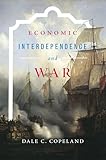Economic interdependence and war / Dale C. Copeland.
Material type: TextSeries: Princeton studies in international history and politicsPublisher: Princeton, New Jersey : Princeton University Press, 2015Description: xiv, 489 pages ; 25 cmContent type: text Media type: unmediated Carrier type: volumeISBN: 9780691161587 (hardback); 9780691161594 (paperback)Subject(s): War -- Economic aspects -- History | War -- Causes | Competition, International | Natural resources -- Political aspects | Military history, Modern | Economic history -- 1750-1918 | Economic history -- 1918-DDC classification: 355.02/73 LOC classification: HB195 | .C693 2015
TextSeries: Princeton studies in international history and politicsPublisher: Princeton, New Jersey : Princeton University Press, 2015Description: xiv, 489 pages ; 25 cmContent type: text Media type: unmediated Carrier type: volumeISBN: 9780691161587 (hardback); 9780691161594 (paperback)Subject(s): War -- Economic aspects -- History | War -- Causes | Competition, International | Natural resources -- Political aspects | Military history, Modern | Economic history -- 1750-1918 | Economic history -- 1918-DDC classification: 355.02/73 LOC classification: HB195 | .C693 2015| Item type | Current library | Collection | Call number | Copy number | Status | Date due | Barcode |
|---|---|---|---|---|---|---|---|
 Book
Book
|
University of Macedonia Library Βιβλιοστάσιο Α (Stack Room A) | Main Collection | HB195.C693 2015 (Browse shelf (Opens below)) | 1 | Available | 0013148814 |
Includes bibliographical references (pages 447-471) and index.
Theory of Economic Interdependence and War -- Quantitative Analysis and Qualitative Case Study Research -- The Russo-Japanese War and the German Wars for Hegemony, 1890-1939 -- The Prelude to Pearl Harbor : Japanese Security and the Northern Question, 1905-40 -- The Russian Problem and the Onset of the Pacific War, March-December 1941 -- The Origins, Dynamics, and Termination of the Cold War, 1942-91 -- European Great Power Politics, 1790-1854 -- Great Power Politics in the Age of Imperial Expansion, 1856-99 -- Implications of the Argument.
"Does growing economic interdependence among great powers increase or decrease the chance of conflict and war? Liberals argue that the benefits of trade give states an incentive to stay peaceful. Realists contend that trade compels states to struggle for vital raw materials and markets. Moving beyond the stale liberal-realist debate, Economic Interdependence and War lays out a dynamic theory of expectations that shows under what specific conditions interstate commerce will reduce or heighten the risk of conflict between nations.Taking a broad look at cases spanning two centuries, from the Napoleonic and Crimean wars to the more recent Cold War crises, Dale Copeland demonstrates that when leaders have positive expectations of the future trade environment, they want to remain at peace in order to secure the economic benefits that enhance long-term power. When, however, these expectations turn negative, leaders are likely to fear a loss of access to raw materials and markets, giving them more incentive to initiate crises to protect their commercial interests. The theory of trade expectations holds important implications for the understanding of Sino-American relations since 1985 and for the direction these relations will likely take over the next two decades. Economic Interdependence and War offers sweeping new insights into historical and contemporary global politics and the actual nature of democratic versus economic peace"-- Provided by publisher.





There are no comments on this title.